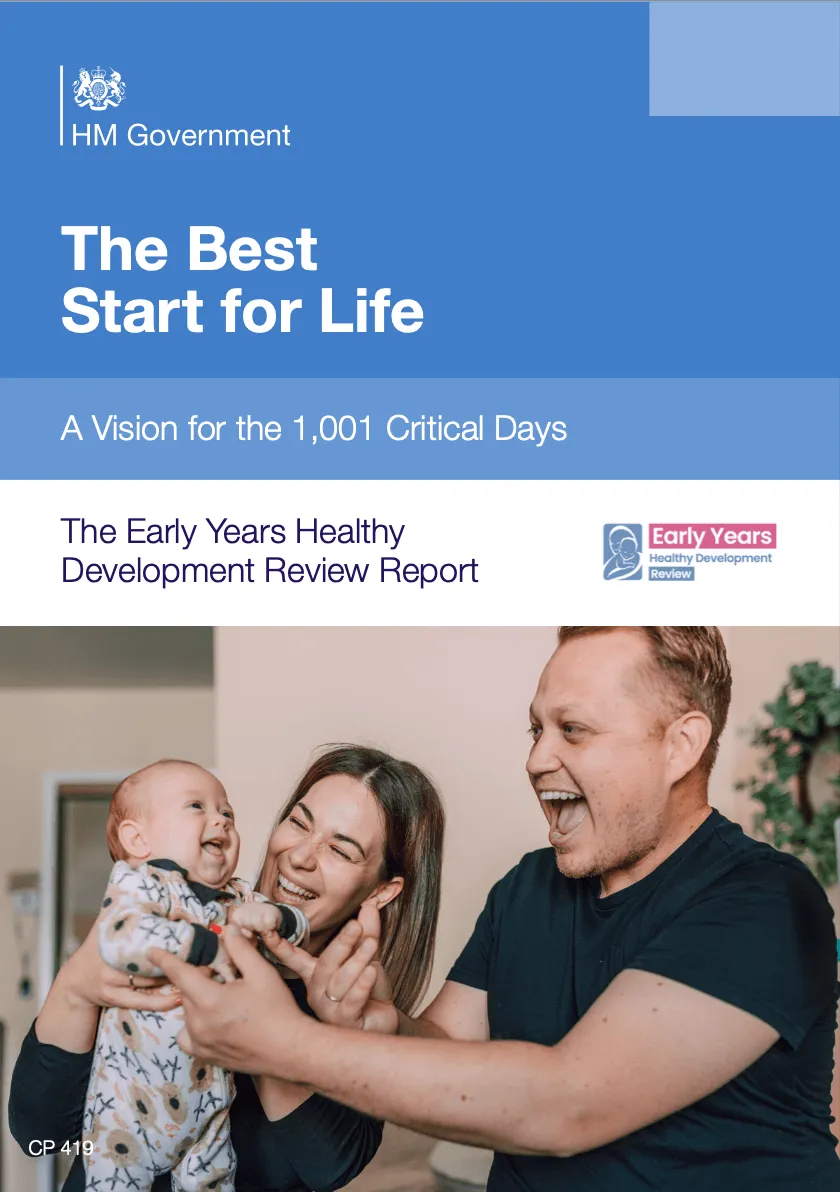
1. The 1,001 days from pregnancy to the age of two set the foundations for an individual’s cognitive, emotional and physical development. There is a well- established and growing international consensus on the importance of this age range; it is part of the World Health Organisation’s Global Strategy for Women’s, Children’s and Adolescents’ Health15, the UNICEF Baby Friendly Initiative16, and in England, both the NHS Long Term Plan¹⁷ and Public Health England’s 2016 guidance on “giving every child the best start in life”.¹⁸
2. These 1,001 days are a critical time for development, but they are also a time when babies are at their most vulnerable. Some babies have a disability diagnosedi; some have a developmental need that is likely to develop into a special educational need once they enter compulsory education if special provision is not made. For others it may take longer for needs to be identified. Babies do not yet have the language skills to advocate for themselves so their carers must advocate on their behalf.
A healthy pregnancy
3 A healthy pregnancy sets up the unborn baby for a healthy life. As the baby grows inside the womb, the foetus is susceptible to the environment around the mother; it hears what the mother hears, consumes what the mother consumes and may react when the mother is distressed.¹⁹ In addition to being important in its own right, the mental and physical wellbeing of the mother is important for the baby’s healthy development.
1,001 Critical Days Manifesto
“A pregnant mother suffering from stress can sometimes pass on the message to the unborn baby that the world will be dangerous, so that as a child he or she will struggle with many social and emotional problems”
– The 1001 Critical Days – The Importance of the Conception to Age Two Period, cross-party ‘manifesto’, 2013, revised 2015 and 2019.²⁰
A healthy start for life
4 During the period from conception to age two, babies are uniquely susceptible to their environment. Babies are completely reliant on their caregivers and later development is heavily influenced by the loving attachment babies have to their parents.
5 Every year researchers learn more about the potentially damaging effects of what are known as ‘adverse childhood experiences’ (ACEs). These are traumatic events which may result from exposure to poor parental mental health, abuse, neglect and parental drug misuse amongst other risk factors. The Review also heard how parental conflict can impact on the mental health of the baby.²¹ That is why it is so important that parents and carers get the right type of support to help them give their babies the best start for life.
6 These 1,001 days are also a critical period for developing communication and physical skills. By the time a baby turns two, they will usually be able to walk unaided, say 50 or more words, kick a ball, climb furniture and scribble spontaneously. However, babies need to be encouraged and supported by their parents and carers to learn these skills and their development must be monitored. If developmental delays are not identified and addressed early, this could cause significant problems later on.
7 Some babies might have a disability or may not follow usual development trajectories. Early diagnosis can improve long term outcomes by ensuring parents and carers have access to the information and provision they need.²²
Parents and carers
8 Pregnancy changes life for parents, carers and the family around them. The healthier a mum is during pregnancy, the easier it will be for her to adapt to her changing body and cope with labour as well as recover fully after the birth.²³
9 The mental health and wellbeing of mums, dads, partners and carers is also important for the development of the baby. Poor mental health can impact a parent’s ability to bond with their baby.²⁴ This is why it is important that parents and carers have their own needs met so they can meet the needs of their baby.
¹⁷ NHS. (2019) The NHS Long Term Plan, online via https://www.longtermplan.nhs.uk/
¹⁸ Public Health England. (2016) Health matters: giving every child the best start in life, online via, https://www.gov.uk/government/publications/health-matters-giving- every-child-the-best-start-in-life/health-matters-giving-every-child-the-best-start-in- life
¹⁹ Cross Party Manifesto. (2013, revised 2015 and 2019) The 1001 Critical Days – The Importance of the Conception to Age Two Period, online via https://www.wavetrust. org/1001-critical-days-the-importance-of-the-conception-to-age-two-period
²⁰ Cross Party Manifesto. (2013, revised 2015 and 2019) The 1001 Critical Days – The Importance of the Conception to Age Two Period, online via https://www.wavetrust. org/1001-critical-days-the-importance-of-the-conception-to-age-two-period
²¹ Early Intervention Foundation. (2017) Interparental conflict and outcomes for children in the contexts of poverty and economic pressure, online via Interparental conflict and outcomes for children in the contexts of poverty and economic pressure | Early Intervention Foundation (eif.org.uk)
²² NHS England. (2018) Quick Guide: Guidance for health services for children and young people with Special Educational Needs and Disability (SEND), online via https://www.england.nhs.uk/wp-content/uploads/2018/07/send-health-services- children-young-people.pdf
²³ NHS. (2019) Pregnancy Information Pages, online via https://www.nhs.uk/ pregnancy/keeping-well/stop-smoking/